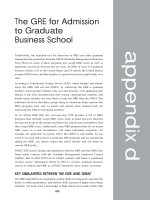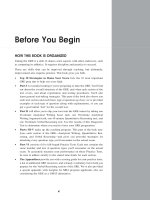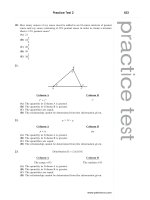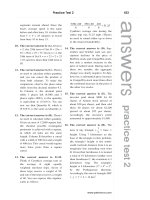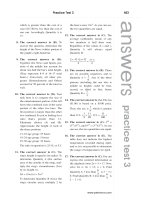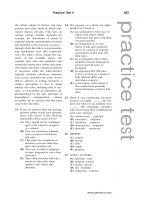Tài liệu In the Supreme Court of Missouri ppt
Bạn đang xem bản rút gọn của tài liệu. Xem và tải ngay bản đầy đủ của tài liệu tại đây (55.45 KB, 23 trang )
KC-1384666-1
No. SC87321
In the
Supreme Court of Missouri
PLANNED PARENTHOOD OF KANSAS AND MID-MISSOURI, INC., et al.,
Plaintiffs-Appellants,
vs.
J
EREMIAH W. (JAY) NIXON, et al.,
Defendants-Respondents.
Appeal from the Circuit Court of Jackson County, Missouri
Case No. 0516-CV25949
The Honorable Charles Atwell, Judge Presiding
BRIEF OF THE AMERICAN JEWISH COMMITTEE AND ELEVEN
OTHER ORGANIZATIONS LISTED ON THE INSIDE COVER
AS AMICI CURIAE
IN SUPPORT OF PLAINTIFFS-APPELLANTS
David B. Tulchin
Claire E. Hunter
Susan M. Tomaine
Aaron O. Lavine
O
F COUNSEL,
125 Broad Street
New York, New York 10004
Telephone: (212) 558-4000
Facsimile: (212) 558-3588
Allan V. Hallquist Mo. Bar #30855
Hayley E. Hanson Mo. Bar #52251
B
LACKWELL SANDERS PEPER MARTIN LLP
4801 Main Street, Suite 1000
Kansas City, Missouri 64112
Telephone: (816) 983-8000
Facsimile: (816) 983-8080
Attorneys for Amici Curiae American
Jewish Committee and the Eleven Other
Organizations Listed on the Inside Cover
M
ARCH 24, 2006
KC-1384666-1
BRIEF OF THE AMERICAN JEWISH COMMITTEE, AMERICANS
FOR RELIGIOUS LIBERTY, ASSOCIATION OF REFORM RABBIS
OF GREATER ST. LOUIS, DISCIPLES FOR CHOICE, DISCIPLES
FOR JUSTICE ACTION, THE ETHICAL SOCIETY OF ST. LOUIS,
NATIONAL COUNCIL OF JEWISH WOMEN, ST. LOUIS AREA
UNITARIAN UNIVERSALIST COUNCIL, ST. LOUIS RABBINICAL
ASSOCIATION, UNITED CHURCH OF CHRIST ST. LOUIS
ASSOCIATION COUNCIL, UNITED SYNAGOGUE OF
CONSERVATIVE JUDAISM AND WOMEN OF REFORM JUDAISM
AS
AMICI CURIAE
IN SUPPORT OF PLAINTIFF-APPELLANTS
KC-1384666-1 -i-
TABLE OF CONTENTS
Page
STATEMENT OF INTEREST OF AMICI CURIAE 1
SUMMARY OF ARGUMENT 1
ARGUMENT 3
The Teen Assistance Ban Unconstitutionally Infringes Upon the
Free Exercise of Religion 3
A. The Teen Assistance Ban Prohibits Pro-Choice
Religious Counseling of Missouri Minors Who
Lack Parental or Judicial Consent 3
B. The Teen Assistance Ban Should Be Subjected to
Intermediate Scrutiny Because It Interferes with
Religious Counseling, a Religiously Motivated
Action that Combines Free Exercise and Free
Speech Rights 4
C. Religious Beliefs About Abortion Are Protected by
the Free Exercise Clause of the United States
Constitution and by the Bill of Rights of the
Missouri Constitution 6
D. The Teen Assistance Ban Substantially Burdens
Clergy’s Free Exercise Rights by Interfering with
Religious Counseling of Missouri Minors Who Do
Not Have Parental or Judicial Consent to Obtain an
Abortion 10
E. The Teen Assistance Ban Unduly Burdens Free
Exercise Because There Is No Compelling State
Interest 13
CONCLUSION 14
-ii-
TABLE OF AUTHORITIES
Page(s)
Federal Cases
Cantwell v. Connecticut,
310 U.S. 296 (1940) 5, 6
Chalifoux v. New Caney Indep. Sch. Dist.,
976 F.Supp. 659 (S.D. Tex. 1997) 5, 6
Employment Div. v. Smith,
494 U.S. 872 (1990) 4, 5
Greenville Women's Clinic v. Comm’n,
317 F.3d 357 (4
th
Cir. 2002) 9, 10, 11
Harris v. McRae,
448 U.S. 297 (1980) 8
Hobbie v. Unemployment Appeals Comm’n,
480 U.S. 136 (1987) 6
McRae v. Califano,
491 F.Supp. 630 (E.D.N.Y. 1980) 7
Mockaitis v. Harcleroad,
104 F.3d 1522 (9
th
Cir. 1997) 11
Murdock v. Pennsylvania,
319 U.S. 105 (1943) 5
Planned Parenthood v. Casey,
505 U.S. 833 (1992) 9
Rigdon v. Perry,
962 F.Supp. 150 (D.D.C. 1997) 7, 11, 12, 13
Roe v. Wade,
410 U.S. 113 (1973) 7, 10
TABLE OF AUTHORITIES
(continued)
Page(s)
-iii-
Sherbert v. Verner,
374 U.S. 398 (1963) 6, 13
Thomas v. Review Bd.,
450 U.S. 707 (1981) 6
W. Va. Bd. of Educ. v. Barnette,
319 U.S. 624 (1943) 4
Watchtower Bible & Tract Soc’y v. Vill. of Stratton,
536 U.S. 150 (2002) 6, 14
State Cases
First Covenant Church of Seattle v. City of Seattle,
840 P.2d 174 (Wash. 1992) 5
Oliver v. State Tax Comm'n,
37 S.W.3d 243 (Mo. 2001) 7
People v. Woody,
394 P.2d 813 (Cal. 1964) 13
Planned Parenthood of Kansas and Mid-Missouri v. Nixon,
Case No. 0516-CV25949 (Cir. Ct. Jackson County 2005) 13
Scott v. Hammock,
870 P.2d 947 (Utah 1994) 11
Constitutional Provisions
Mo. Const., Article I 2, 6
U.S. Const., Amendment I 2
Statute
Mo. Rev. Stat. § 188.250 1, 3, 12
TABLE OF AUTHORITIES
(continued)
Page(s)
-iv-
Other Authorities
American Baptist Churches USA, Resolutions: Abortion (Concerning,
and Ministry in the Local Church) (adopted, June 1988, modified,
March 1994) 8
Congregation for the Doctrine of the Faith, Declaration on Procured
Abortion (Nov. 18, 1974) 7
Covenant and Creation: Theological Reflections on Contraception and
Abortion, Minutes of the 195th General Assembly of the
Presbyterian Church 369 (1983) 9
Hayim Halevy Donin, To Be a Jew (1972) 9
David M. Feldman, Marital Relations, Birth Control, and Abortion in
Jewish Law (1986) 9
Evangelical Lutheran Church in America, What We Say About Public
Life: Abortion (1991) 8
Frances Kissling, Prayerfully Pro-Choice: Resources for Worship
(1999) 7
Resolution No. 1994-AO54: Reaffirm General Convention Statement on
Childbirth and Abortion, Journal of the 71st General Convention of
The Episcopal Church (1994) 8
Fred Rosner & J. David Bleich eds., Jewish Bioethics (1979) 9
United Church of Christ General Synod Statements and Resolutions
Regarding Freedom of Choice: 12th General Synod 1979 (1979) 8
United Methodist Church, The Book of Discipline of the
United Methodist Church (1996) 8
-1-
STATEMENT OF INTEREST OF AMICI CURIAE
Amici are twelve religious and religiously-affiliated organizations
committed to preserving religious freedom for all persons and to protecting a
woman’s right to carry or terminate her pregnancy in accordance with her
religious beliefs and values.
1
Amici have a shared interest in the right of a woman
of any age to make reproductive choices in accordance with her individual
conscience and free from governmental interference. Further, amici submit that
access to religious counseling is an important part of the free exercise of religion,
and that minor women should be able to obtain access to religious counseling
when making the difficult decision of whether to terminate a pregnancy. Amici
recognize that there are many divergent theological perspectives regarding
abortion and contend that clergy should be free to provide counseling on
reproductive choices without governmental interference.
SUMMARY OF ARGUMENT
Mo. Rev. Stat. § 188.250(1) (the “Teen Assistance Ban” or the
“Act”) – which creates civil liability for persons who “intentionally cause, aid, or
assist” minors in obtaining abortions without parental consent – is an
unconstitutional infringement of the Free Exercise Clause of the First Amendment
of the United States Constitution, which applies to Missouri through the
1
Amici submit this brief amici curiae with the consent of the parties to this
appeal. A letter confirming this consent has been filed with the Court.
-2-
Fourteenth Amendment of the United States Constitution, and Section 5 of Article
I of the Bill of Rights in the Missouri Constitution. The First Amendment
provides in relevant part: “Congress shall make no law respecting an
establishment of religion, or prohibiting the free exercise thereof . . . .” U.S.
Const., Amend. I. Section 5 of the Missouri Bill of Rights provides in relevant
part “that no human authority can control or interfere with the rights of conscience
. . . .” Mo. Const., Art. I, §5.
The broad language of the Teen Assistance Ban exposes a member
of the clergy who provides religious counseling to a Missouri minor woman to
civil liability if such counseling includes information about terminating her
pregnancy and if she does not have parental or judicial consent to have an
abortion. This restriction on religious counseling of minors concerning abortion
rights is an undue burden on the Free Exercise rights of both the clergy and young
women who seek out their counsel, as well as a violation of the Missouri
Constitution. Religious doctrine and beliefs about abortion are varied and clergy
often are called upon to communicate to congregants religious beliefs on that
subject. Such counseling is a protected religious act which is substantially
burdened by the Teen Assistance Ban.
Because the Act implicates the right to free speech in addition to
religious freedom, it should be subjected to heightened scrutiny by this Court. The
-3-
legislature has not provided a compelling state interest that it seeks to further with
the Teen Assistance Ban. As a result, the Act must be declared unconstitutional.
ARGUMENT
The Teen Assistance Ban Unconstitutionally Infringes Upon the Free Exercise
of Religion.
A. The Teen Assistance Ban Prohibits Pro-Choice Religious
Counseling of Missouri Minors Who Lack Parental or Judicial
Consent
The Teen Assistance Ban prohibits any person – without exception –
from “intentionally caus[ing], aid[ing] or assist[ing]” Missouri minors to obtain
abortions without first complying with Missouri’s parental consent abortion law.
Mo. Rev. Stat. § 188.250(1).
2
The Act thus broadly prohibits speech that provides
information about or support to Missouri minors who seek to have an abortion
without parental or judicial consent. Of particular importance to amici is that the
Act effectively bans counseling about abortion – including by clergy – of Missouri
2
The Teen Assistance Ban provides in relevant part:
“1. No person shall intentionally cause, aid, or assist a minor to obtain an abortion
without the consent or consents required by section 188.028.
“2. A person who violates subsection 1 of this section shall be civilly liable to the
minor and to the person or persons required to give the consent or consents
under section 188.028 . . .
“3. It shall not be a defense to a claim brought under this section that the abortion
was performed or induced pursuant to consent to the abortion given in a
manner that is otherwise lawful in the state or place where the abortion was
performed or induced.”
-4-
minors who do not have parental or judicial consent. Indeed, the Act purports to
prohibit such counseling of a Missouri minor even as to obtaining abortions in the
neighboring states of Illinois and Kansas, where it is lawful for a minor to have an
abortion without parental consent.
B. The Teen Assistance Ban Should Be Subjected to Heightened
Scrutiny Because It Interferes with Religious Counseling, a
Religiously Motivated Action that Combines Free Exercise and
Free Speech Rights
The Teen Assistance Ban should be subjected to heightened scrutiny
by this Court. The Act is not, on its face, directed at restricting religious exercise;
rather, it is a facially neutral law that has the effect of burdening religious exercise.
In general, such laws are subjected to rational basis scrutiny. This Court,
however, should apply a heightened or intermediate level of scrutiny in assessing
the constitutionality of the Teen Assistance Ban because it implicates both
freedom of religion and free speech. Employment Div. v. Smith, 494 U.S. 872,
881-82 (1990).
Rigorous judicial review must be applied to laws that impinge upon
religious speech to ensure that “no official, high or petty, can prescribe what shall
be orthodox in . . . religion . . . or force citizens to confess by word or act their
faith therein.” W. Va. Bd. of Educ. v. Barnette, 319 U.S. 624, 642 (1943). The
United States Supreme Court has broadly held that facially neutral laws that
burden “religiously motivated action[s]” and unduly infringe upon free exercise
-5-
rights “in conjunction with other constitutional protections, such as freedom of
speech . . .” – so called “hybrid rights” – should be struck down as
unconstitutional. Smith, 494 U.S. at 881 (citing, inter alia, Cantwell v.
Connecticut, 310 U.S. 296, 304-07 (1940) and Murdock v. Pennsylvania, 319 U.S.
105 (1943)). See also Chalifoux v. New Caney Indep. Sch. Dist., 976 F. Supp.
659, 671 (S.D. Tex. 1997) (holding that “heightened level of scrutiny” applies to
“religion-plus-speech cases” and applying heightened judicial review in declaring
unconstitutional a school safety regulation that prohibited wearing of Catholic
rosary beads because “plaintiffs’ causes of action combine free exercise of religion
and free speech claims . . . . [and] the regulation places an undue burden on
Plaintiffs, who seek to display the rosary . . . as a sincere expression of their
religious beliefs”); First Covenant Church of Seattle v. City of Seattle, 840 P.2d
174, 181-83, 185 (Wash. 1992) (holding that a zoning law which required a
religious organization to obtain government permission to alter the outside of a
church “impermissibly infringes on the religious organization’s right to free
exercise and free speech” because the state did not show that the law limiting
religious speech had used the “least restrictive means” to further a “compelling
state interest”).
Although Smith indicates that hybrid rights are entitled to a higher
level of scrutiny than rational basis review, it does not specify whether such rights
are entitled to intermediate or strict scrutiny. Subsequent cases suggest, however,
-6-
that the appropriate level of scrutiny is at least intermediate; that is, in order to
sustain a burden on Free Exercise rights, “the government must demonstrate more
than merely a reasonable relation” to a compelling state interest. Chalifoux, 976 F.
Supp at 671. See also Watchtower Bible & Tract Soc'y v. Vill. of Stratton, 536
U.S. 150, 168-169 (2002) (intermediate scrutiny applied to ordinance that
prohibited door-to-door canvassing without a license on the basis that the
ordinance implicated both free exercise and free speech). Because the Teen
Assistance Ban interferes with counseling by clergy – a practice that implicates
both free speech and free exercise – an intermediate level of heightened scrutiny
should be applied.
C. Religious Beliefs About Abortion Are Protected by the Free
Exercise Clause of the United States Constitution and by the Bill
of Rights of the Missouri Constitution
Individual beliefs rooted in religion are protected by the Free
Exercise Clause. Cantwell, 310 U.S. at 303; Sherbert v. Verner, 374 U.S. 398,
402 (1963). Similarly, the Bill of Rights of the Missouri Constitution protects “the
rights of conscience.” Mo. Const., Art. I, §5. The United States Supreme Court has
used an expansive approach in defining what qualifies as a religious belief.
Thomas v. Review Bd., 450 U.S. 707, 714 (1981) (“religious beliefs need not be
acceptable, logical, consistent or comprehensible to others in order to merit First
Amendment protection”); Hobbie v. Unemployment Appeals Comm’n, 480 U.S.
136, 144 (1987) (newly adopted religious views are fully protected). This Court
-7-
has also broadly construed the Free Exercise Clause, holding that it protects “the
right to believe and profess whatever religious doctrine one desires.” Oliver v.
State Tax Comm'n, 37 S.W.3d 243, 248 (Mo. 2001).
Religious groups in our country disagree profoundly about abortion.
See Roe v. Wade, 410 U.S. 113, 160-61 (1973). Religious doctrine on abortion
varies widely among faiths, as well as among denominations of the same religion
and among even clergy people of the same denomination. For many, beliefs about
abortion are sincerely held and deeply religious. See, e.g., Rigdon v. Perry, 962 F.
Supp. 150, 161 (D.D.C. 1997) (holding that anti-abortion views of military clergy
were sincerely held religious beliefs).
Some religions have issued formal declarations on the subject of
abortion to guide congregants. The Roman Catholic Church has declared that life
begins at conception and that consequently, abortion is an “immoral” act. See
Congregation for the Doctrine of the Faith, Declaration on Procured Abortion
(Nov. 18, 1974).
3
Many Protestant theologians and scholars, on the other hand,
maintain that “human personhood . . . does not exist in the earlier phases of
pregnancy,” McRae v. Califano, 491 F. Supp. 630, 701 (E.D.N.Y. 1980), rev’d on
3
Although at least one Catholic organization, Catholics for a Free Choice,
has stated that there “is much in the Catholic tradition that supports the pro-
choice position.” Frances Kissling, Prayerfully Pro-Choice: Resources for
Worship 112 (Religious Coalition for Reproductive Choice 1999).
-8-
other grounds sub nom. Harris v. McRae, 448 U.S. 297 (1980), and as a result
some Protestant denominations believe that abortion is permitted in many
circumstances.
4
Other Protestant denominations recognize that there is a diversity
of views within their own membership and as a result oppose governmental
restriction on abortion.
5
Within the Jewish tradition, there is considerable
4
See, e.g., Resolution No. 1994-AO54: Reaffirm General Convention
Statement on Childbirth and Abortion, Journal of the 71st General
Convention of The Episcopal Church, 323-25 (1994) (expressing
“unequivocal opposition to any legislative, executive or judicial action on
the part of local, state or national governments that abridges the right of a
woman to reach an informed decision about the termination of pregnancy
or that would limit the access of a woman to safe means of acting on her
decision”); United Church of Christ General Synod Statements and
Resolutions Regarding Freedom of Choice: 12th General Synod 1979
(1979) (affirming “abortion may sometimes be considered,” and that “God
calls us when making choices, especially as these relate to abortion, to act
faithfully”); United Methodist Church, The Book of Discipline of the
United Methodist Church 65 (English ed. 1996) (expressing equal belief in
the “sanctity of unborn human life,” and “the sacredness of the life and
well-being of the mother, for whom devastating damage may result from an
unacceptable pregnancy”); Evangelical Lutheran Church in America, What
We Say About Public Life: Abortion (1991) (stating that “there can be
sound reasons for ending a pregnancy through induced abortion. We
recognize that conscientious decisions need to be made in relation to
difficult circumstances that vary greatly”).
5
See, e.g., American Baptist Churches USA, Resolutions: Abortion
(Concerning, and Ministry in the Local Church) (adopted, June 1988,
modified, March 1994) (“Recognizing that each person is ultimately
responsible to God, we encourage women and men [considering abortion]
to seek spiritual counsel as they prayerfully and conscientiously consider
their decision. … Many of our membership seek legal safeguards to protect
unborn life. Many others advocate for and support family planning
legislation, including legalized abortion as being in the best interest of
(Footnote continued…)
-9-
consensus that the fetus is not a person before birth, and that abortion is permitted,
and may even be required in situations where the life of the mother is threatened.
David M. Feldman, Marital Relations, Birth Control, and Abortion in Jewish Law,
271-84 (1986); see also Hayim Halevy Donin, To Be a Jew 140-41 (1972) (“All
halakhic scholars agree that therapeutic abortions – namely, abortions performed
in order to preserve the life of the mother – are not only permissible but
mandatory”).
6
The religious significance of abortion has also been recognized by
the courts. See, e.g., Planned Parenthood v. Casey, 505 U.S. 833, 852 (1992)
(holding that “the abortion decision is more than a philosophic exercise.
Abortion is a unique act [that is] fraught with consequences”); Greenville
Women’s Clinic v. Commission, 317 F.3d 357, 364 (4th Cir. 2002) (noting that the
(Footnote Continued…)
women in particular and society in general.”); Covenant and Creation:
Theological Reflections on Contraception and Abortion, Minutes of the
195th General Assembly of the Presbyterian Church 369 (1983)
(“pluralism of beliefs . . . leads us to the conviction that the decision
regarding abortion must remain with the individual, to be made on the basis
of conscience and personal religious principles, and free from governmental
interference.”).
6
There is disagreement among different branches of Judaism about the legal
and moral status of non-therapeutic abortions and about the circumstances
under which they are permitted. See, e.g., Feldman, supra, at 284-94;
Immanuel Jakobovits, “Jewish Views on Abortion,” and J. David Bleich,
“Abortion in Halakhic Literature,” in Jewish Bioethics 118, 134 (Fred
Rosner & J. David Bleich eds., 1979).
-10-
availability of religious counseling about the abortion decision is important
“because of the gravity of a woman’s right to make the abortion decision”); Roe v.
Wade, 410 U.S. at 116 (“One’s philosophy, one’s experiences, one’s exposure to
the raw edges of human existence, one’s religious training, one’s attitudes towards
life and family and their values, and the moral standards one establishes and seeks
to observe, are all likely to influence and to color one’s thinking and conclusions
about abortion.”)
D. The Teen Assistance Ban Substantially Burdens Clergy’s Free
Exercise Rights by Interfering with Religious Counseling of
Missouri Minors Who Do Not Have Parental or Judicial
Consent to Obtain an Abortion
Because to many abortion is a religious issue, and counseling on
religious issues is a religious exercise, providing counseling on abortion is a
religious exercise. Greenville Women’s Clinic v. Commission, 317 F. 3d 357, 364
(4th Cir. 2002). The Teen Assistance Ban’s prohibition of religious counseling of
pregnant minors who lack parental consent or judicial sanction to obtain an
abortion is a state-imposed burden on this fundamental exercise of a religious
right.
The right to obtain or to offer religious counsel uninhibited by
government interference is protected by the Free Exercise Clause of the First
Amendment to the United States Constitution and by the Bill of Rights of the
Missouri Constitution. Courts have recognized the importance of religious
-11-
counseling as a protected religious exercise in several contexts. See, e.g., Scott v.
Hammock, 870 P.2d 947, 951-54 (Utah 1994) (recognizing a clergy-communicant
privilege and noting that “compelling a priest to breach the confidentiality of the
confessional would violate the constitutional right to the free exercise of
religion”); Mockaitis v. Harcleroad, 104 F.3d 1522, 1530 (9th Cir. 1997) (holding
that taping a prisoner’s religious confession to a Catholic priest “substantially
burdened [the priest’s] exercise of religion as understood in the First
Amendment”); Rigdon v. Perry, 962 F. Supp. 150, 164 (D.D.C. 1997) (holding
that an administrative regulation prohibiting military chaplains from “advocat[ing]
what they believe to be appropriate religious conduct” was unconstitutional
because it “muzzl[ed] religious guidance”).
At least one court has also held that religious counseling on abortion
is protected by the First Amendment. In Greenville Women’s Clinic v.
Commission, a South Carolina regulation requiring abortion clinics to make
available religious counselors was challenged as a violation of the Establishment
Clause of the First Amendment. The Court of Appeals for the Fourth Circuit held
that the regulation did not violate the Establishment Clause, noting that, “[r]ather
than establishing religion, [it] would appear at most to require a clinic to
accommodate the requests of patients to exercise religion, a right also protected by
the First Amendment.” Greenville Women’s Clinic v. Commission, 317 F. 3d at
364. The court also observed that religious counseling is particularly appropriate
-12-
“because of the gravity of a woman’s right to make the abortion decision.” Id.
Similarly, in Rigdon, 962 F. Supp. at 164, the United States District Court for the
District of Columbia held that a military regulation which prohibited anti-abortion
clergy from counseling congregants to write letters to their Congressmen
supporting a ban on “partial-birth” abortions was an undue burden on free
exercise.
Here, Missouri has prohibited clergy from providing religious
counseling about abortion to pregnant Missouri teens who do not have parental or
judicial consent to obtain an abortion. The statute restricts the content of religious
counseling by prohibiting clergy from providing information to a minor who lacks
consent that could aid or assist her in obtaining an abortion outside of the state of
Missouri, where it is lawful to do so. In particular, if a clergy member provided
information about abortion clinics in Illinois and Kansas, that advice could expose
him or her to civil liability under the Teen Assistance Ban, Mo. Rev. Stat.
188.250(2), even though it would be legal for the Missouri minor to obtain an
abortion without parental consent in, and under the laws of, those states. The
clergy members of amici who provide religious counseling on abortion issues, as
well as the clergy counselors of plaintiff-appellant Missouri Coalition for
Reproductive Choice, often provide this type of information to pregnant minors
and as a result will be restricted in the counsel they can provide by the Teen
Assistance Ban. ROA 0027-8 (Turner Aff. ¶¶9-10).
-13-
E. The Teen Assistance Ban Unduly Burdens Free Exercise
Because There Is No Compelling State Interest
Where a sincere religious belief is substantially burdened by
government action, the state must show that the burden is justified by some
compelling state interest. Sherbert v. Verner, 374 U.S. 398, 406 (1963); see also
People v. Woody, 394 P.2d 813 (Cal. 1964) (holding unconstitutional the
conviction of American Indians for the religious use of peyote because it did not
meet the compelling state interest requirement); Rigdon, 962 F. Supp. at 162
(holding that maintenance of a politically neutral military is not a sufficiently
compelling objective to justify the burden on free exercise from prohibition on
religious counseling on abortion).
In enacting the Teen Assistance Ban, our Legislature has not
provided or even suggested any such compelling state interest. Judge Atwell, in
the trial court, noted that “[i]t is reasonable to believe that the majority of the
Missouri Legislature felt that regulating or restricting abortions for minors
constitutes a legitimate and compelling state interest.” Planned Parenthood of
Kansas and Mid-Missouri v. Nixon, Case No. 0516-CV25949 at 21 (Cir. Ct.
Jackson County 2005). The state is not entitled to the benefit of an inference that
the impugned legislation protects some unidentified compelling state interest.
Rather, the state must affirmatively demonstrate a compelling state interest that is
being furthered. Sherbert, 374 U.S at 406. Where intermediate scrutiny applies,
-14-
“the Court ordinarily does not supply reasons the legislative body has not given.”
Watchtower Bible & Tract Soc’y of N.Y., Inc. v. Vill. of Stratton, 536 U.S. 150,
170 (2002) (Breyer, J., concurring). Given the absence of any articulated
compelling state interest, the Teen Assistance Ban must be declared
unconstitutional under the First Amendment of the United States Constitution and
the Bill of Rights of the Missouri Constitution.
CONCLUSION
For the foregoing reasons, as well as those advanced by the Plaintiff-
Appellants, this Court should declare the Teen Assistance Ban unconstitutional as
violative of the Free Exercise Clause of the First Amendment to the United States
Constitution and Section 5 of the Bill of Rights of the Missouri Constitution.
-15-
Respectfully submitted,
/s/ Hayley Hanson
Allan Hallquist #30855
Hayley Hanson # 52251
B
LACKWELL SANDERS PEPER MARTIN, LLP
4801 Main Street, Suite 1000
Kansas City, Missouri 64112
Telephone: (816) 983-8000
Facsimile: (816) 983-8080
David B. Tulchin
Claire E. Hunter
Susan M. Tomaine
Aaron O. Lavine
O
F COUNSEL,
125 Broad Street
New York, NY 10004
Telephone: (212) 558-4000
Facsimile: (212) 558-3588
Attorneys for Amici Curiae The American
Jewish Committee, Americans for Religious
Liberty, Association of Reform Rabbis of
Greater St. Louis, Disciples for Choice,
Disciples for Justice Action, The Ethical
Society of St. Louis, National Council of
Jewish Women, St. Louis Area Unitarian
Universalist Council, St. Louis Rabbinical
Association, United Church of Christ St.
Louis Association Council, United
Synagogue of Conservative Judaism,
Women of Reform Judaism.
March 24, 2006
RULE 84.06(C) CERTIFICATION
I hereby certify that this brief complies with the type-volume
limitations of Rule 84.06(b) of the Missouri Rules of Civil Procedure. This brief
was prepared in Microsoft Word 2002 and contains 3959 words, excluding those
portions of the brief listed in Rule 84.06(b) of the Missouri Rules of Civil
Procedure. The font is Times New Roman, proportional spacing, 13-point type.
A 3 ½ inch computer diskette (which has been scanned for viruses and is virus
free) containing the full text of this brief has been served on each party separately
represented by counsel and is filed herewith with the clerk.
/s/ Hayley Hanson
Allan Hallquist #30855
Hayley Hanson # 52251
B
LACKWELL SANDERS PEPER MARTIN, LLP
4801 Main Street, Suite 1000
Kansas City, Missouri 64112
Telephone: (816) 983-8000
Facsimile: (816) 983-8080
David B. Tulchin
Claire E. Hunter
Susan M. Tomaine
Aaron O. Lavine
O
F COUNSEL,
125 Broad Street
New York, NY 10004
Telephone: (212) 558-4000
Facsimile: (212) 558-3588
CERTIFICATE OF SERVICE
I hereby certify that a copy of the foregoing brief and a diskette
containing the brief were mailed, postage prepaid, this 23
rd
day of March 2006,
addressed to the following:
Michael E. C. Pritchett
Assistant Attorney General
Broadway State Office Building
221 West High Street, 8th Floor
Post Office Box 899
Jefferson City, MO 65102
Randell G. Collins
Senior Assistant County Counselor
Office of the County Counselor
415 E. 12th Street, Second Floor
Kansas City, MO 64106
John L. Patton
Boone County Counselor
601 E. Walnut Street, Room 207
Columbia, MO 65201
Scott Ingram
Assistant Circuit Attorney
City of St. Louis
1114 Market Street, Fourth Floor
Mel Carnahan Building
St. Louis, MO 63103
/s/ Hayley Hanson
Allan Hallquist Mo. Bar #30855
Hayley Hanson Mo. Bar # 52251
B
LACKWELL SANDERS PEPER MARTIN, LLP
4801 Main Street, Suite 1000
Kansas City, Missouri 64112
Telephone: (816) 983-8000
Facsimile: (816) 983-8080
David B. Tulchin
Claire E. Hunter
Susan M. Tomaine
Aaron O. Lavine
O
F COUNSEL,
125 Broad Street
New York, NY 10004
Telephone: (212) 558-4000
Facsimile: (212) 558-3588




